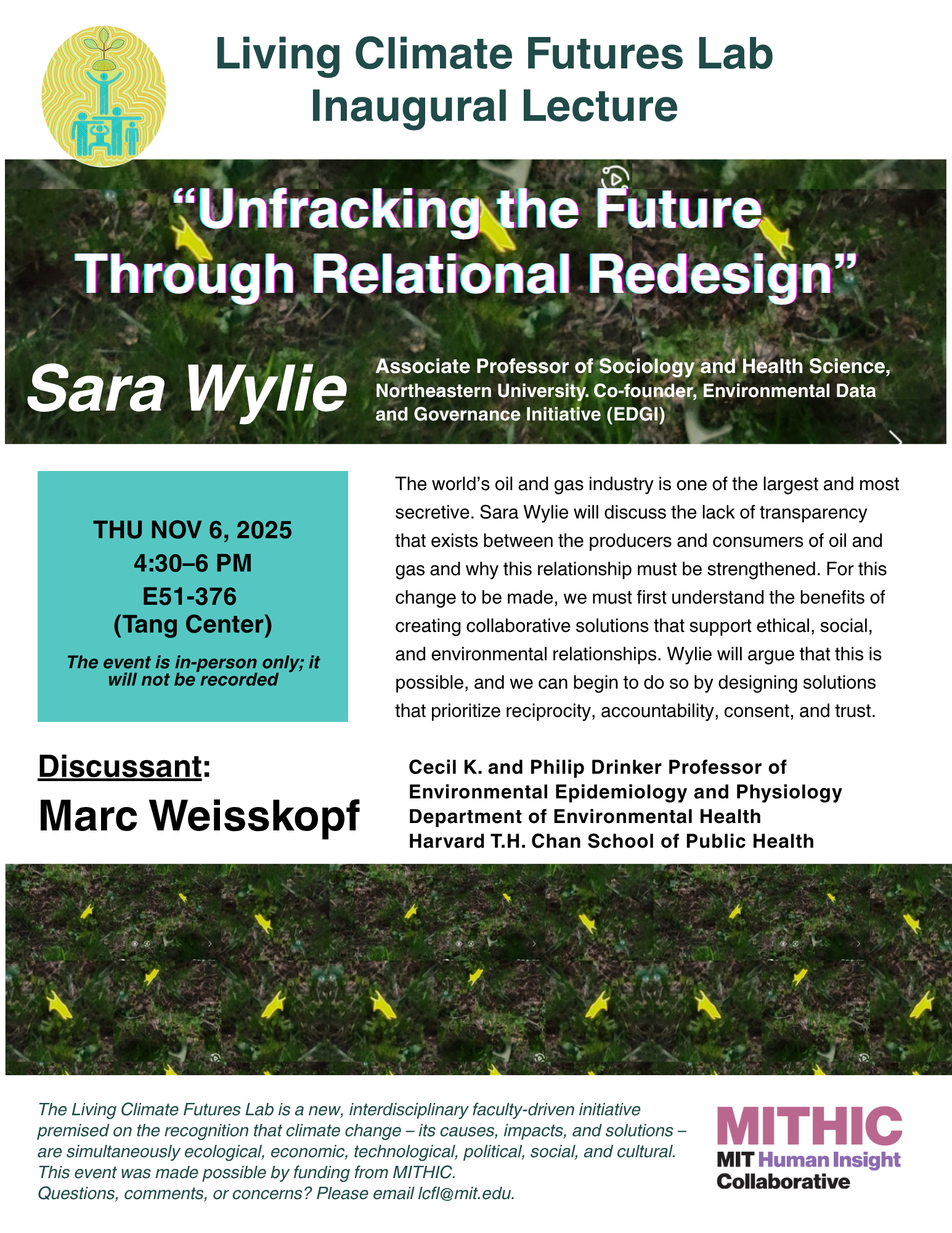Living Climate Futures Lab Inaugural Lecture “Unfracking the Future Through Relational Redesign” with Sara Wiley and Discussant Marc Weisskopf
Thursday, November 6, 2025 4:30 - 6:00 PM E51-376 (Tang Center)
The world’s oil and gas industry is one of the largest and most secretive. Sara Wylie will discuss the lack of transparency that exists between the producers and consumers of oil and gas and why this relationship must be strengthened. For this change to be made, we must first understand the benefits of creating collaborative solutions that support ethical, social, and environmental relationships. Wylie will argue that this is possible, and we can begin to do so by designing solutions that prioritize reciprocity, accountability, consent, and trust.
This event is in-person only and will not be recorded.
The Living Climate Futures Lab is a new, interdisciplinary faculty-driven initiative premised on the recognition that climate change – its causes, impacts, and solutions – are simultaneously ecological, economic, technological, political, social, and cultural. This event was made possible by funding from MITHIC.
Questions, comments, or concerns? Please email lcfl@mit.edu.
Speaker: Sara Wylie, PhD MIT HASTS, is an Associate Professor Sociology/Anthropology and Health Science at Northeastern University. She is a cofounder of the Environmental Data and Governance Initiative (EDGI), a network of academics and non-profits working to develop more just and effective forms of environmental governance through ensuring and improving public access to data. Sara is a cofounder of Public Lab, a non-profit that developed open source, Do-It-Yourself tools for community-based environmental analysis. Her award winning book Fractivism: Corporate Bodies and Chemical Bonds describes the need to rethink the extractive research systems that proceed and enable extractive industries. Under the Biden Administration, Dr. Wylie served as an Energy Justice, Science, Technology and Policy Fellow for the Office of Economic Impact and Diversity at the US Department of Energy and helped develop accountability systems for Biden's Justice 40 Initiative.
Discussant: Marc G. Weisskopf, Ph.D., Sc.D., is the Cecil K. and Philip Drinker Professor of Environmental Epidemiology and Physiology at the Harvard T.H. Chan School of Public Health in the departments of Environmental Health and Epidemiology, Director of the Harvard TH Chan NIEHS Center for Environmental Health, Director of Epidemiological Studies for the Football Players Health Study at Harvard, and codirector of the JPB Environmental Health Fellowship Program. Dr. Weisskopf received his Ph.D. in Neuroscience from the University of California, San Francisco, and his Sc.D. in Epidemiology from the Harvard T.H. Chan School of Public Health. He also spent two years as an Epidemic Intelligence Service Officer with the Centers for Disease Control and Prevention working on environmental health issues in the Wisconsin State Health Department. His neuroscience work focused on molecular and cellular aspects of neural signaling and plasticity. His epidemiological work focuses on the influence of environmental exposures on brain health across the life course. In particular, his research focuses on environmental risk factors for outcomes such as autism spectrum disorders, amyotrophic lateral sclerosis, cognitive function and dementia, and psychiatric conditions. Dr. Weisskopf also explores epidemiological methods issues to improve causal inference from observational environmental health studies.
